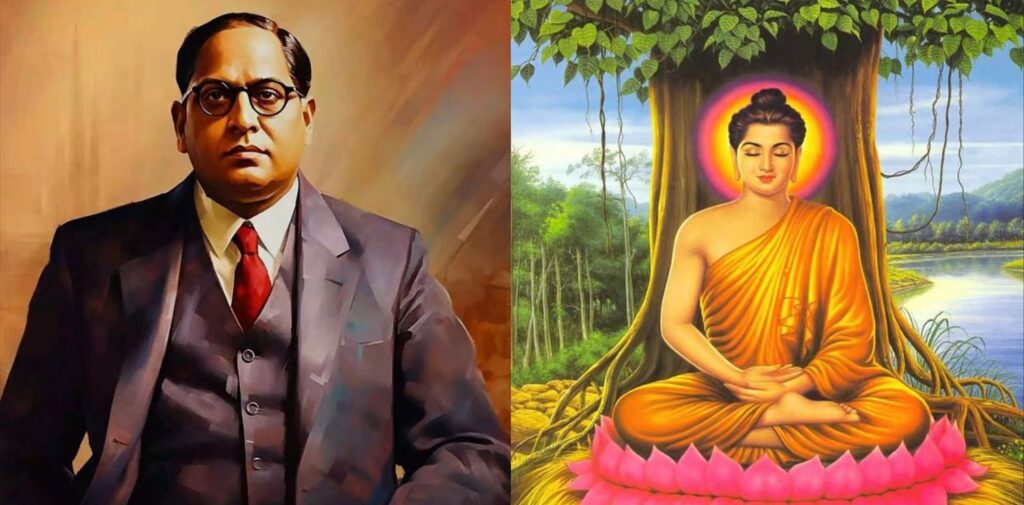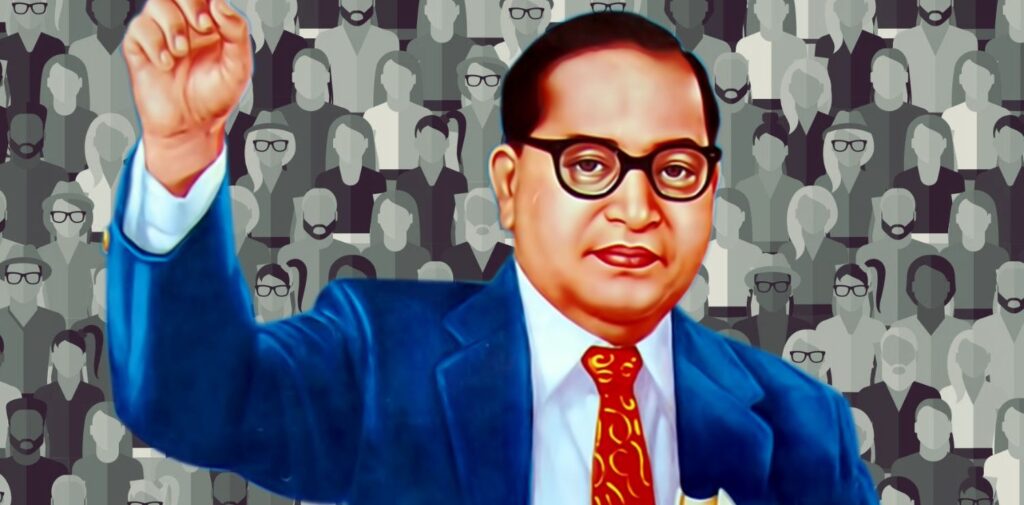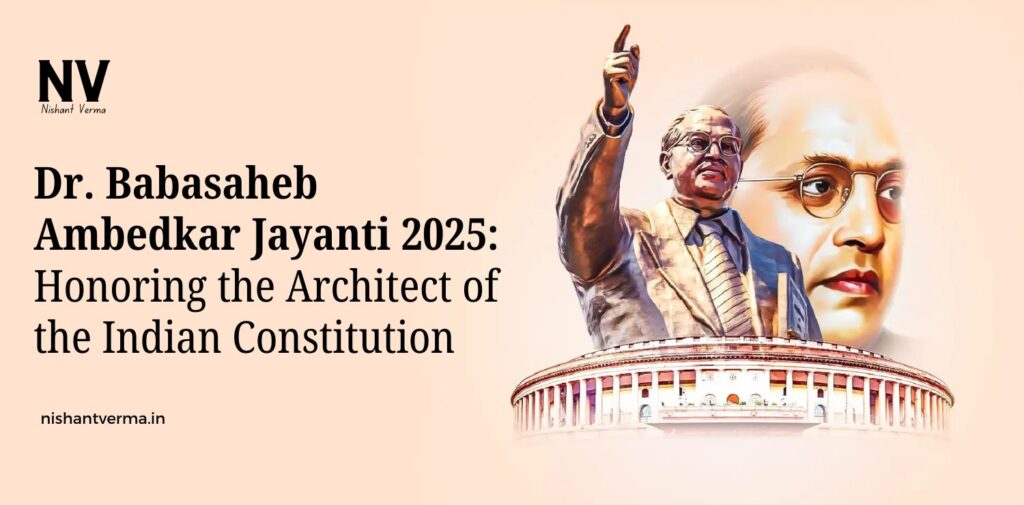Dr. Bhimrao Ramji Ambedkar, fondly known as Babasaheb Ambedkar, is one of the most influential figures in the history of India. His contributions to the nation’s social, economic, and political landscape have been monumental, and his legacy continues to inspire millions of Indians today. Dr. Ambedkar Jayanti, observed on 14th April every year, is a day of reflection, celebration, and remembrance. On this day, people across India honor the life, work, and vision of Dr. Babasaheb Ambedkar, who played a key role in drafting the Indian Constitution and fighting for the rights of the marginalized, particularly the Dalits.
The Life and Legacy of Dr. Babasaheb Ambedkar
Dr. Babasaheb Ambedkar was born on 14th April 1891, in the town of Mhow, in present-day Madhya Pradesh. He came from an untouchable community, which meant that he faced extreme social discrimination and hardships throughout his childhood. Despite these challenges, Ambedkar showed exceptional academic brilliance and went on to become one of the most educated and respected leaders of his time.
He earned multiple degrees, including a doctorate in law from Columbia University and the London School of Economics. Ambedkar’s academic achievements were remarkable, especially considering the social and economic obstacles that he had to overcome. His education played a crucial role in shaping his ideas on social justice, equality, and human rights.
Dr. Ambedkar’s life was defined by his relentless fight against social inequality and injustice. He devoted his life to uplifting the Dalit community, which had been oppressed for centuries due to the rigid caste system in India. His efforts were not limited to social reform; he also worked towards the political and economic empowerment of the marginalized sections of society.

Dr. Ambedkar’s Role in the Indian Constitution
One of Dr. Babasaheb Ambedkar’s most enduring legacies is his pivotal role in drafting the Indian Constitution. After India gained independence in 1947, a Constituent Assembly was formed to create a new constitution for the country. Dr. Ambedkar was appointed as the Chairman of the Drafting Committee, a position that allowed him to influence the development of the fundamental laws that govern the nation.
Dr. Ambedkar’s vision for the Constitution was one of equality, justice, and protection of rights for all citizens, especially the oppressed and marginalized. He ensured that the Constitution enshrined provisions for the abolition of untouchability, the protection of the rights of women, and the promotion of social and economic justice. The Indian Constitution, which came into effect on 26th January 1950, is a testament to his belief in human dignity and the principle of equal rights for all.
His role as the chief architect of the Indian Constitution is one of the primary reasons why Dr. Ambedkar is regarded as the “Father of the Indian Constitution.” The Constitution that he helped create has been instrumental in shaping India’s democratic and secular identity. It guarantees fundamental rights, including the right to equality, freedom of speech, and protection from discrimination, ensuring that every citizen, regardless of their caste, creed, or gender, is treated with dignity.
Dr. Ambedkar and the Fight Against Social Inequality
Dr. Babasaheb Ambedkar’s life was deeply intertwined with the struggle against the social hierarchies entrenched in India’s caste system. For centuries, Dalits (historically referred to as “untouchables”) were subjected to social exclusion, discrimination, and oppression. Ambedkar, who himself belonged to a Dalit family, experienced the hardships of this system firsthand.
Throughout his life, Dr. Ambedkar was a fierce advocate for the rights of the Dalits. He believed that social justice could only be achieved by dismantling the caste system and ensuring equal opportunities for all. He made it his life’s mission to raise awareness about the atrocities committed against Dalits and worked tirelessly to create a more inclusive society.
One of his significant contributions in this regard was his leadership in the fight for the rights of Dalits to access public places, such as temples and water sources, which were often reserved exclusively for the higher castes. His participation in movements like the “Mahad Satyagraha” and the “Kalaram Temple Satyagraha” was instrumental in challenging the discriminatory practices of untouchability.
Dr. Ambedkar also recognized the importance of education in empowering Dalits. He advocated for better educational opportunities for marginalized communities, understanding that education was the key to social and economic mobility. His efforts led to the establishment of various institutions dedicated to the upliftment of Dalits and other backward communities.

The Conversion to Buddhism: A New Path for Dalits
One of the most significant moments in Dr. Ambedkar’s life was his conversion to Buddhism. In 1956, a few months before his death, Dr. Ambedkar, along with thousands of his followers, embraced Buddhism as a means of breaking free from the shackles of the caste system. For Dr. Ambedkar, Buddhism represented a path to equality and social justice, offering a rejection of the hierarchical and oppressive nature of Hinduism at the time.
Dr. Ambedkar’s conversion to Buddhism was a powerful statement against the discrimination faced by Dalits in Hindu society. It was also a call for social change, as he sought to promote a philosophy based on equality, compassion, and respect for all human beings. The conversion to Buddhism has had a lasting impact, especially in Maharashtra and other parts of India, where many Dalits followed Dr. Ambedkar’s example and embraced Buddhism as a way to break free from caste-based oppression.
Celebrating Dr. Ambedkar Jayanti: A Day of Reflection and Remembrance
Dr. Ambedkar Jayanti, celebrated on 14th April each year, is a day to honor and reflect upon the life and contributions of Dr. Babasaheb Ambedkar. On this day, people across India, particularly in Maharashtra, hold rallies, processions, and ceremonies to pay tribute to the man who fought for justice, equality, and the rights of the oppressed.
The celebrations begin with people visiting the statue of Dr. Ambedkar, especially in cities like Mumbai, Pune, and Nagpur, where large gatherings take place. Thousands of people gather to offer flowers, chant slogans of equality, and participate in prayers for the upliftment of society. Many institutions, including schools, colleges, and universities, organize events and discussions on Dr. Ambedkar’s life and work.
Dr. Ambedkar Jayanti is also a time for the Dalit community to come together and reflect on their progress, challenges, and future. The day serves as a reminder of the ongoing struggle for equality and social justice in India. It is a call to continue Dr. Ambedkar’s work, advocating for the rights of the marginalized and working towards a society where discrimination is eradicated, and every individual is treated with dignity.

Dr. Ambedkar’s Vision for India and Its Relevance Today
Dr. Ambedkar’s vision for India was one of an inclusive and egalitarian society, where everyone had the opportunity to live a life of dignity and respect, regardless of their caste, religion, or gender. His belief in the importance of education, social justice, and equality remains highly relevant today. While India has made significant progress in various areas, challenges such as caste-based discrimination, poverty, and social inequality still persist.
Dr. Ambedkar’s teachings continue to inspire movements for social change, human rights, and justice. His advocacy for the rights of women, religious minorities, and marginalized communities resonates with people who are fighting for equality and social reform. His life and work remind us of the importance of standing up against injustice and working toward a fairer and more inclusive society.
Conclusion: Dr. Babasaheb Ambedkar Jayanti
Dr. Babasaheb Ambedkar Jayanti, celebrated on 14th April 2025, is a day to reflect on the life, work, and vision of one of India’s greatest leaders. His contributions to the nation—whether in drafting the Indian Constitution, advocating for the rights of Dalits, or promoting the values of justice, equality, and human dignity—have had a lasting impact on India’s social, political, and cultural landscape.
On this day, as we honor Dr. Ambedkar’s legacy, we are reminded of the ongoing fight for social equality and justice. His work continues to inspire people to challenge discrimination, embrace education, and promote social change. Dr. Ambedkar’s vision of a just and equal society remains an enduring goal for all of us to strive toward, ensuring that the rights and dignity of every individual are respected.




